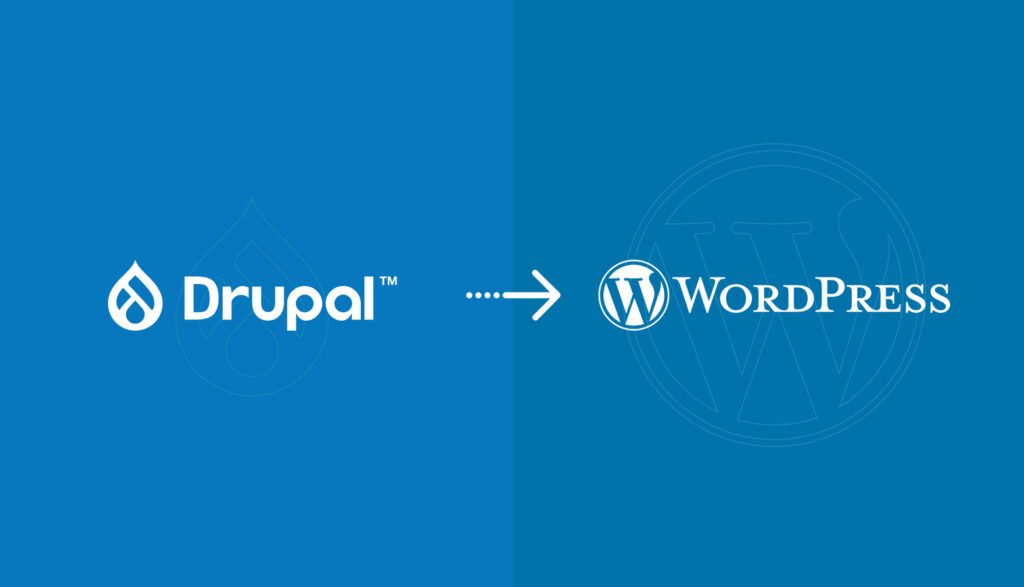When most of us think about content management software (CMS), WordPress is the ultimate product that comes to mind. Although WordPress is one of the most popular and easy to use CMS product among users and reviewers.
One product that has proven popular among larger business and business clients is Drupal.
Although Drupal is similar to WordPress in many ways, it also offers many different features. The biggest blow against Drupal is that it is not a product adapted for beginners – one of the reasons why it has only less than 4% market share on world websites.
However, Drupal swears by a number of websites, including those of many government and educational organizations. In general, Drupal offers a much more powerful product than WordPress or Joomla, which is more focused on the initial web design market.
1. Drupal is better for high content websites
Drupal is often considered a good choice for building high content websites because of its robust content management features. It offers a wide range of modules and tools that make it easy to organize and manage large amounts of content, including multimedia and other types of files.
Additionally, Drupal’s security features and user permissions make it well-suited for sites that require access control and data protection. However, it is also a complex system and requires a lot of resources and technical knowledge to setup and maintain, so it may not be the best choice for small or simple websites.
2. You are enabled by superior access control
Drupal does have more advanced access control features compared to WordPress, which makes it a good choice for sites that require fine-grained control over user permissions. Drupal’s core installation includes the User and Role modules, which allow for the creation of different user roles and the assignment of specific permissions to those roles.
This can be used to control who has access to certain parts of the site, such as content creation, editing, and deletion. Additionally, Drupal also has a wide range of contributed modules available that can add even more granular access control capabilities, such as the Organic Groups, Taxonomy Access Control, and Field Permissions modules.
On the other hand, WordPress has a more basic user management system, which allows for the creation of different user roles, but does not provide as much control over permissions. WordPress also has fewer options for controlling access to specific parts of the site. In summary, Drupal has more advanced access control features and granular control over user permissions, making it a better choice for sites that require a high level of access control.
3. Your website will be multilingual by default
Drupal does have built-in multilingual support, which makes it a good choice for websites that need to display content in multiple languages. The core installation of Drupal includes the Locale module, which enables language detection and translation of content. Additionally, there are many contributed modules available that can help with multilingual content management, such as the Content Translation and Interface Translation modules.
On the other hand, WordPress does not come with built-in multilingual support. However, there are many third-party plugins available that can add this functionality to WordPress. Some popular ones include WPML and Polylang. These plugins enable the translation of posts, pages, and other types of content, as well as the management of different language versions of a site.
In summary, Drupal has better built-in multilingual support, but WordPress can also be made multilingual with the use of third-party plugins.
4. Drupal gets hacking a lot less and for good reason
Drupal is considered to be a more secure platform compared to WordPress. Drupal has a number of built-in security features and a robust security release process that helps to quickly address any security vulnerabilities that are discovered.
Additionally, the Drupal community places a strong emphasis on security, and there are many resources and best practices available to help secure a Drupal site. However, no platform is completely immune to hacking attempts, and Drupal sites can still be vulnerable if not properly maintained and secured. It is important to keep the core software and any modules or themes up-to-date, and to follow best practices for securing the site, such as using strong passwords and limiting access to the administrative interface.
WordPress is also considered to be relatively secure, however, it is a more popular platform, and thus it is more likely to be targeted by hackers. Additionally, WordPress has a more open architecture which makes it easier for the hackers to find vulnerabilities. WordPress also has a lot of third-party plugins and themes which can be exploited by hackers. In summary, Drupal is generally considered to be more secure than WordPress, but both platforms can be made secure with proper maintenance and security practices.
5. You are ready to take your development to another level
Drupal’s architecture is built on a modular system, which allows for the addition of custom functionality through the use of modules. Additionally, Drupal’s powerful theme system allows for the creation of highly customized designs, and its ability to handle complex data relationships makes it well-suited for sites with large amounts of content.
Drupal also has a large and active community of developers, which means that a wide range of modules, themes, and other resources are available to help with development. Additionally, Drupal’s API’s are robust and allow for easy integration with external systems. WordPress is also a popular platform for web development and can be used to create a wide range of websites and web applications.
However, it is generally considered to be better suited for simpler sites and blogs. WordPress’s plugin architecture allows for the addition of custom functionality, but it can be more limited compared to Drupal. Additionally, while WordPress’s theme system allows for the creation of custom designs, it may not be as flexible as Drupal’s.
6. Upgrade your skills and upgrade your website using Drupal
Drupal can offer developers the opportunity to upgrade their skills by working on more complex and challenging projects. The platform’s modular architecture and powerful APIs make it possible to create custom functionality, and its support for complex data relationships allows for the development of more sophisticated content management systems.
Additionally, because Drupal is a more complex platform than WordPress, developers may need to learn more advanced concepts and technologies in order to build and maintain Drupal sites, which can help to expand their skill set.
By choosing Drupal as the platform for your website, you will also be able to upgrade your website to be more powerful, flexible and feature-rich. Drupal’s built-in content management features and its wide range of modules and add-ons can help to make your site more efficient, and its ability to handle complex data relationships allows you to manage and display large amounts of content. Additionally, with Drupal’s advanced access control and security features, you can be confident that your site is protected from unauthorized access and hacking attempts.
In summary, using Drupal for your website can help you upgrade your skills and your website, by providing you with the tools and resources to build more complex and feature-rich sites.




Pingback: Key Features of Content Management Systems (CMS) - Tech Hyme